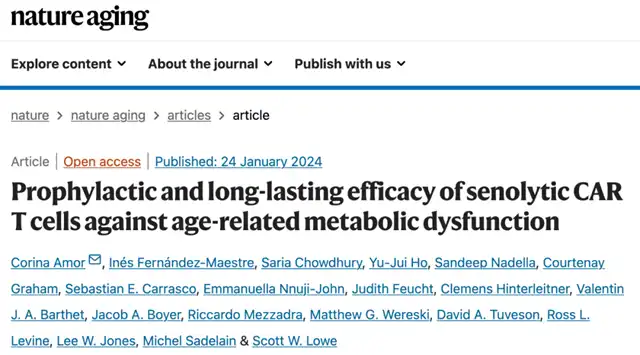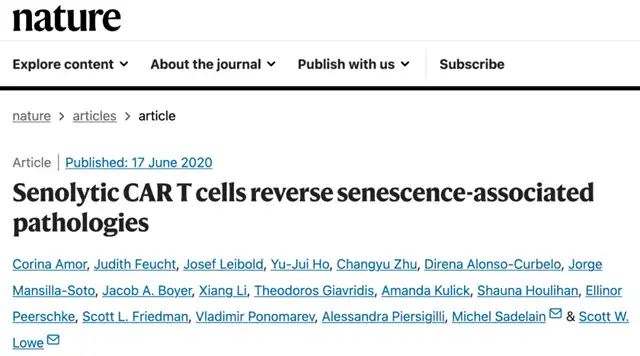CAR-T Therapy: Lifelong Clearance of Aging Cells Slows Aging Process
- Normal Liver Cells Found to Promote Cancer Metastasis to the Liver
- Nearly 80% Complete Remission: Breakthrough in ADC Anti-Tumor Treatment
- Vaccination Against Common Diseases May Prevent Dementia!
- New Alzheimer’s Disease (AD) Diagnosis and Staging Criteria
- Breakthrough in Alzheimer’s Disease: New Nasal Spray Halts Cognitive Decline by Targeting Toxic Protein
- Can the Tap Water at the Paris Olympics be Drunk Directly?
CAR-T Therapy: Lifelong Clearance of Aging Cells Slows Aging Process
- Should China be held legally responsible for the US’s $18 trillion COVID losses?
- CT Radiation Exposure Linked to Blood Cancer in Children and Adolescents
- FDA has mandated a top-level black box warning for all marketed CAR-T therapies
- Can people with high blood pressure eat peanuts?
- What is the difference between dopamine and dobutamine?
- How long can the patient live after heart stent surgery?
CAR-T Therapy: Lifelong Clearance of Aging Cells Slows Aging Process
Cellular aging is a stress response program that, with the progression of age, results in the accumulation of aging cells in our bodies due to a combination of increased tissue damage and decreased immune system function. These aging cells enter a stable cell cycle arrest state, producing the senescence-associated secretory phenotype (SASP), leading to a harmful inflammatory environment.
In 2015, James Kirkland and colleagues at the Mayo Clinic proposed a Senolytic strategy using a combination of dasatinib and quercetin, selectively inducing death in aging cells and effectively extending the lifespan of experimental animals. Subsequent research introduced various Senolytic strategies, often requiring repeated use.
On January 24, 2024, Corina Amor and her team at Cold Spring Harbor Laboratory published a study titled “Prophylactic and long-lasting efficacy of senolytic CAR T cells against age-related metabolic dysfunction” in the journal Nature Aging.
The study indicates that CAR-T cells targeting the protein highly expressed in aging cells, urokinase-type plasminogen activator receptor (uPAR), can selectively eliminate aging cells, restoring vitality in elderly mice and slowing aging in young mice.
Due to the memory and long lifespan of T cells, this Senolytic CAR-T cell therapy requires only a single administration for long-term therapeutic and preventive effects.

Accumulation of aging cells in the body leads to age-related tissue degeneration. Clearing these aging cells can improve age-related pathologies and contribute to extending healthy lifespan.
Currently, most efforts in developing Senolytic therapies focus on small molecule drugs targeting unclear molecular pathways in aging cells, requiring repetitive use over time. In contrast, CAR-T cells are a living cell therapy, reprogramming T cells to target specific cell surface antigens on cancer cells.
Unlike small molecules, CAR-T cells only need differential expression of the target antigen on target and normal tissues. As a living cell therapy, CAR-T cell therapy has the potential to exert a powerful and sustained effect after a single administration. Patients who received CAR-T cell therapy over a decade ago still have active CAR-T cells in their bodies.
In June 2020, Corina Amor and her team published a study titled “Senolytic CAR-T cells reverse senescence-associated pathologies,” introducing a CAR-T cell-based Senolytic therapy targeting uPAR, effectively clearing aging cells in young animals and reversing liver fibrosis.
The latest research published in Nature Aging explores whether Senolytic CAR-T cells can safely and effectively clear aging cells in elderly mice and regulate their lifespan.

The research team demonstrated that CAR-T cells targeting uPAR-positive aging cells could safely clear these cells during the aging process in mice. Treatment with uPAR-targeted CAR-T cells improved the mobility of elderly mice and alleviated metabolic dysfunctions in both elderly mice and those on a high-fat diet, such as improved glucose tolerance, without causing tissue damage or toxicity.
Moreover, this Senolytic CAR-T cell therapy only requires a single administration for long-term therapeutic and preventive effects.
Corresponding author Corina Amor stated that this CAR-T therapy rejuvenated elderly mice and slowed aging in young mice. With T cells having memory-forming capabilities and long-lasting presence in the body, this approach holds immense potential for many age-related diseases. Imagine a single injection during youth preventing common age-related diseases throughout life.
The research team is currently further investigating whether Senolytic CAR-T cells can not only make mice healthier but also extend their lifespan. If successful, we may be one step closer to discovering the “Fountain of Youth.”
Notably, in August 2023, a team led by Zhao Xudong from West China Hospital of Sichuan University, in collaboration with Professor Deng Yibin from the University of Minnesota, published a study in the journal Science Translational Medicine titled “NKG2D-CAR T cells eliminate senescent cells in aged mice and nonhuman primates.”

The study revealed that NKG2D ligands (NKG2DL) are upregulated in aging cells. Developing NKG2D-CAR-T cell therapy targeting cells expressing NKG2DL selectively in human cells, mice, and non-human primates, the research team demonstrated that this therapy could serve as an effective and selective anti-aging treatment for aging and age-related diseases driven by aging.
Research Paper Links:
CAR-T Therapy: Lifelong Clearance of Aging Cells Slows Aging Process
(source:internet, reference only)
Disclaimer of medicaltrend.org
Important Note: The information provided is for informational purposes only and should not be considered as medical advice.



